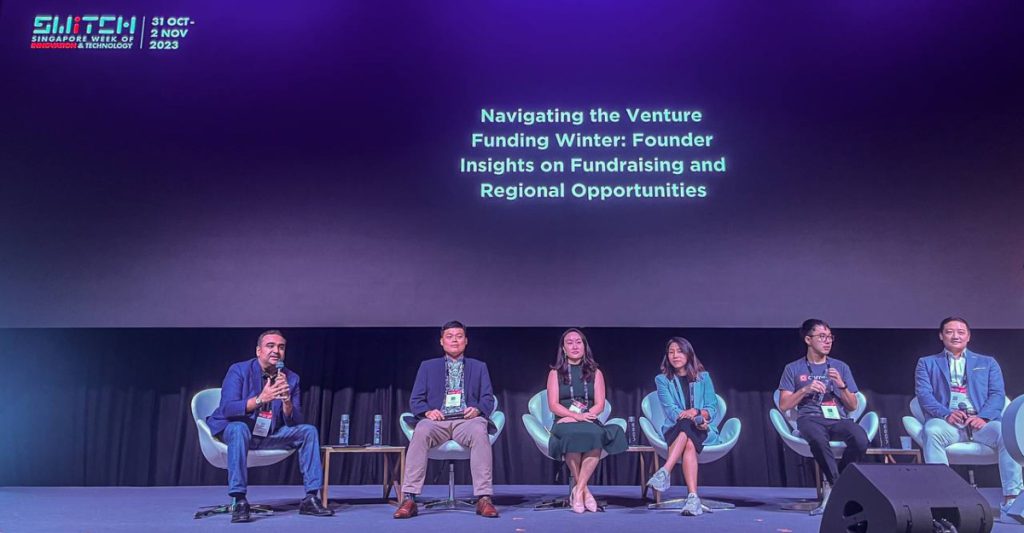After Southeast Asian startups witnessed a funding boom three years ago with venture funding reaching over US$8 billion in the first half of 2020, the startup funding winter has officially set in, with venture funding dwindling to a mere US$2.3 billion.
For the uninitiated, a funding winter refers to a period in the startup and venture capital ecosystem where there is a reduced availability of funding for new and early-stage companies. The number of companies that have raised rounds in excess of US$100 million this year are only six — a stark contrast from 18 companies that achieved this milestone in 2020,
During a panel discussion at the Singapore Week of Innovation and Technology (SWITCH) 2023 last Tuesday (October 31), Singapore startup founders and CEOs weighed in on the city-state’s funding landscape.
What is causing the funding winter?
Over the past decade, Southeast Asia saw a fairly expansionary business environment, with funding becoming easily accessible due to low interest rates and the macroeconomic environment across the region.
“As long as you managed to spin the right story at the right point of time, it was easy to get funding,” said Alvin Teo, co-founder and Chief Partnerships Officer of Ninja Van.
But with money supply shrinking due to macroeconomic headwinds after the COVID-19 pandemic, investors are tightening their purse strings and becoming more cautious in where they are spending their capital.
While startups can’t pivot their business models overnight just to secure funding in today’s economic landscape, Alvin suggests that they could pivot their proposition and put together a strong pitch that meets the expectations of investors — and this ultimately depends on “who their investors are”.
Are [your investors] looking at you as a means to a get-rich-quick scheme because their fund is looking to wind down in three years, or are you their means of global expansion? Your pitch to your investors has to be tweaked according to whoever you’re speaking to.
– Alvin Teo, co-founder and Chief Partnerships Officer, Ninja Van
Building a sustainable business

A strong pitch alone, however, isn’t enough to gain the trust and confidence of the investors. ShopBack co-founder, Josephine Chow, views that proving a business’ sustainability in today’s macroeconomic landscape is a fundamental key to securing funding opportunities.
“I think [the funding landscape has] changed a lot from when are you going to be doing this project, to why are you doing this project, in the last couple of years,” she said. Although the shopping and rewards company managed to raise a total of US$160 million in its series F round last year, Josephine recalled that “it was a very tough journey” for ShopBack as it struggled to “balance that question”.
While the business has been “rather lucky” in the sense that it has been able to achieve success in a short span across various markets, the co-founder says that it all “comes down to the business plan” of a startup.
The worst thing you can do is to build a business plan that promises a 200 per cent year-on-year growth, but end up only delivering 50 per cent of that — building your credibility after that is super tough. So it’s really about being realistic and sustainable from the start and thinking about how exactly you’re going to be delivering what your investors are expecting you to deliver.
– Josephine Chow, co-founder, ShopBack
One way startups can do this is by focusing on their operational and financial discipline. When patent analytics company PatSnap first brought in a Silicon Valley investor during its Series B funding round back in 2016, the company was consistently pushed to develop critical business metrics such as customer acquisition costs, renewal costs, and conversion rates.
“These conversations [on business metrics] are ingrained into our daily operational discussions, so it did not cause us as much pain during the economic downturn,” shared Guan Dian, the co-founder and APAC General Manager of PatSnap.
Competition vs complexity
With investors becoming more selective of their investments, it’s vital for startups to show “proof points” of their business models prior to raising funds.
“Start with something small that has big value creation, and then convince slowly and build from there,” said Stephan Tan, Group Chief Strategy Officer and Chief Executive Officer of Insurance Solutions, of bolttech.
Startups have two ways of navigating this challenge — by taking on competition, or tackling complexity. When entering a market where your product already exists, a startup’s business model will likely turn out to be successful if it manages to differentiate itself in the saturated market.
On the other hand, if a startup enters a market where there is no competition, it needs to navigate the complexities of educating its stakeholders, including potential customers and investors, on its products and services.

Reflecting on bolttech’s journey of establishing its presence in the insurance industry, Stephan admitted that the startup initially faced a tough beginning as it sought to disrupt the industry.
The thing about the insurance industry is that it is highly regulated and because there is a lot of cashflow in the industry already, it takes a lot to convince business partners to change their mindset to do something new. The industry itself is doing well, so you will hit a lot of walls when it comes to convincing them.
– Stephan Tan, Group Chief Strategy Officer and Chief Executive Officer of Insurance Solutions, bolttech
Despite these obstacles, bolttech managed to raise the largest Series A round for an insurtech company in 2021 by spending time on due diligence and focusing on its niche.

Carousell, on the other hand, faced tremendous competition from startups in the resale space when the company first started out 10 years ago. In order to differentiate itself from the sea of competitors, co-founder Marcus Tan shared it took a similar approach by starting out with “micro-networks”.
“I always believed in “starting small” — you should be free to dream big, but no matter how big your dreams or ideas are, you should always start super small. Carousell started with a group of customers — about 10 of them — who really loved our product, and we grew from there,” said Marcus. This small “proof point” managed to land the startup an investment from Sequoia Capital in its initial stages.
Market presence plays a part in securing investments
The viability and scalability of a startup in global markets beyond Singapore can also play a part in attracting investors. This is especially so for startups that operate in a high growth industry, such as the e-commerce industry.
For instance, if Ninja Van were to position itself as a company with a smaller geographical coverage by just focusing on the Singapore market, the logistics solutions provider would have been a “lot less appealing to investors” given the larger macroeconomic perspective of the industry.
“The growth rates of the e-commerce industry outside of Singapore was going to be so much higher than Singapore itself, so by having a presence across Southeast Asia, we get to expand our pool of addressable investors,” explained Alvin.

Echoing the same sentiments, Marcus shared that when Carousell realised that Singapore was a relatively small market, the startup “learned very quickly that it needed to expand overseas”.
While it was still “securing” its position as “a leader in the Singapore market”, the secondhand marketplace also channeled its efforts into “test launching” its secondhand platform in two other markets.
“We needed capital to continue on this growth trajectory, and that was where Sequoia Capital came in during our Series A fundraising to propel the company further and monetise [the business],” said Marcus. “Investors want to invest into big ideas, so international expansion beyond Singapore’s shores is quite important from an investor’s lens.”
Choosing the right investors
Navigating the funding winter is challenging, but it’s not impossible to secure funding. Nonetheless, it’s still important for startups to choose their investors carefully to steer their companies in the right direction.
To be very honest, in very early days, startups don’t really have much options, so they take what they can get. But as they grow, they’re bound to have more options later on.
We [PatSnap] were quite conscious about who we wanted to bring on, because it’s not only about the money — if an investor invests a significant amount, they’ll be able to take a board seat. So it’s about who you want on your company’s board, and what kind of experience they bring to the table.
– Guan Dian, co-founder and APAC General Manager, PatSnap

As PatSnap focuses on R&D analytics, the company wanted to onboard a variety of experienced investors who could scale the company further. Given that the biggest R&D expanding countries were the United States, China, Japan, and Germany, the company had to cast its net internationally to attract the right investors.
Today, PatSnap’s investor portfolio consists of a mix of financial investors and former entrepreneurs that both have their “own networks” and “own values” to bring to the company.
The invaluable experiences investors bring onboard a company can also fuel a startup’s growth beyond borders, such as ShopBack’s expansion into the German market. When looking at international expansions, success heavily depends on localisation and the ability of a business to understand the requirements of new markets.
As a Singaporean, I don’t really know anything about Germany. I know how important the European Union’s General Data Protection Regulation is on a piece of paper, but if I’m going to talk to a German, they’re going to tell you, hey, you know, I’m not gonna give you any of my data at all.
But if you have an experienced investor to give the you advice and supplement you with market knowledge, you can actually effectively prepare your business before prematurely launching it in a new market.
– Josephine Chow, co-founder, ShopBack
Ultimately, through these strategies, startups can not only successfully navigate the funding winter, but also weather the challenges of macroeconomic headwinds and achieve growth with support from the right investors.
ANEXT Bank, a Singapore-based digital bank regulated by MAS, empowers startups with easy and accessible financing to fuel their business growth and expansion.
Feature Image Credit: Vulcan Post










